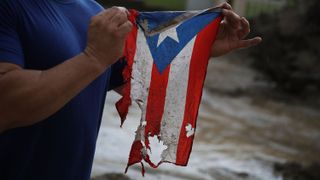On September 20, 2017, Puerto Rico was hit by Hurricane Maria, a Category-4 storm likely killing thousands and costing an estimated US$90 billion in damages to an already financially-struggling island. A study from the New England Journal of Medicine projected that the storm caused 4,645 deaths — one third of which were a result of slow medical care responses — while the US government reported a death toll of only 64.
While the storm wiped out the island’s power grid, the US federal government’s response to the crisis has been by most accounts even worse, as thousands of people continue to live without electricity ten months later. The lack of urgency by the government in the island’s recovery is indicative of Puerto Rico’s second-class status as a US territory, making it clear that it would be better off as a state.
The lack of urgency by the government in the island’s recovery is indicative of Puerto Rico’s second-class status as a US territory, making it clear that it would be better off as a state.
Indeed, the hurricane seems to have exacerbated the systemic challenges Puerto Rico has faced for some time now. The Puerto Rico Electric Authority (PREPA), the island’s inefficiently functioning and indebted public utility, has failed to restore power amidst an ongoing battle for its authority between Governor Ricardo Roselló and the Puerto Rico Oversight Management and Economic and Stability Act (PROMESA).
PROMESA, a special legislative act passed by Congress in June 2016, has resulted in the untenable position of restricted Puerto Rican sovereignty and insufficient US federal oversight. A seven-member civilian oversight board with members essentially chosen by Congress, PROMESA was intended to guide the island through its $123 billion debt restructuring. However, PROMESA has become an extra bureaucratic obstacle for Puerto Rico's rebuilding efforts. PROMESA legislation not only hindered the Puerto Rican government from selling the necessary assets to privatise PREPA, it also proved unable to fix the mismanaged public utility when a federal judge rejected the oversight board's request to replace PREPA’s insolvent leadership.
The tension PROMESA created has heightened the frustrations felt by island residents along with President Trump’s underwhelming response to the crisis. The US government deployed far less emergency personnel, supplies, and FEMA-approved emergency assistance to Puerto Rico than it did Houston following Hurricane Harvey, and despite the heightened severity of Hurricane Maria, the president criticised the San Juan mayor for pleading for federal help.
Given the administration seems indifferent to the island’s plights, statehood would give Puerto Rico the sovereign power necessary to address its challenges most effectively.
Given the administration seems indifferent to the island’s plights, statehood would give Puerto Rico the sovereign power necessary to address its challenges most effectively. While Puerto Ricans are split on the issue, Maria has now left the island with few viable alternatives. Statehood would enable the island to capitalise on benefits that US states are privy to, including voting power and the full benefits of Medicare and social security.
Congress only further hampered Puerto Rico’s post-hurricane recovery economy with the 2017 tax overhaul. Passed three months after the hurricane, the tax law treats Puerto Rico like a foreign nation by imposing a 12.5 per cent tax on the income earned by mainland companies on intellectual property, thereby eliminating its prior advantage to investors that saw major businesses, including large pharmaceutical companies, locate to Puerto Rico.
In many ways, statehood is in the US government’s interest: If granted statehood, Puerto Rico could add $7.2-11.6 billion in federal taxes while becoming a haven for businesses and tourism and – in the era of America First – appeal to Trump’s goal of reducing federal deficits.






